CENSUS 2021 – THE DEMISE OF RELIGION IN WALES?
Summary of a presentation by Gethin Rhys to the East Glamorgan Association of Welsh Independent Churches.
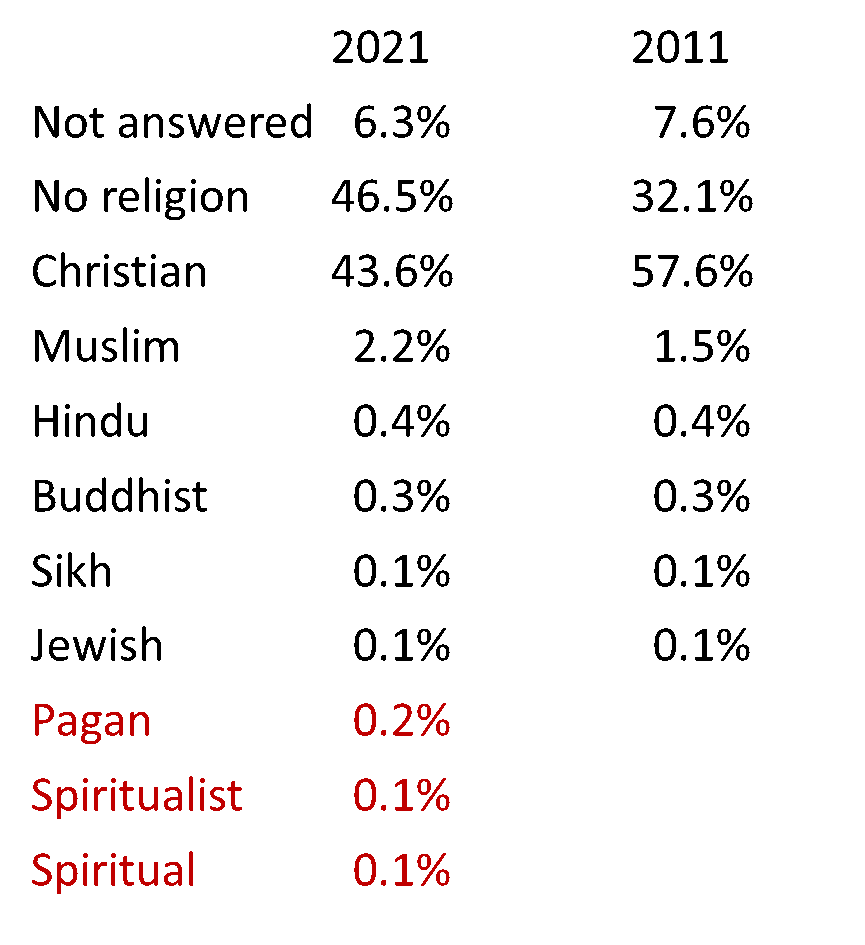
For some, the results of the 2021 Census with regard to religion came as something of a shock, and Wales is the only nation within the United Kingdom where the largest group are those who identify as having no religion. More research will be needed to understand the motivations of those who responded, and further analysis of the figures will be published over the next year or two.
What follows are only some initial comments, but enough I hope to spark discussion.
Firstly, there was a 14% reduction in the numbers who say they are Christian. Our experience as churches is that many of the 57.6% who answered that way in 2011 did not follow the religious practices of Christianity, even occasionally. For many the answer was an expression of cultural heritage or a sense of identity; for others it would indicate perhaps their desire to have a Christian funeral at the end of their lives. Perhaps the opportunity in this Census for the first time to note one’s national identity has reduced the number who previously used Christian identity as a cipher for this.
As a result, the 2021 results are more realistic than previously in terms of the numbers who have a practical attachment of some kind with a Christian congregation, or who engage with Christianity through social or traditional media. There is every reason to believe that this is already true of the other religions listed – that the 67,000 who stated that they were Muslims, the 12,000 Hindus, 10,000 Buddhists, 4000 Sikhs and 2000 Jews are realistic reflections of the religious population.
Secondly, the details of local areas which can be seen in this interactive map show large variations across Wales. In some areas, churches and chapels say that percentages as low as 10% of Christians are contrary to their experience of local support for the place of worship and its work. In other areas, high percentages contrast with small congregations, and suggest that there is still an element of cultural response in the numbers. All local congregations will benefit from browsing this interactive map to learn more about many of aspects of life in their area – and more results are added regularly.
Thirdly, the think tank Theos has already published research about some of those people – across the UK – who answered that they had ‘No religion’. This interesting research, under the title The Nones: Who are they and what do they believe? shows the wide diversity that exists within this group of society. Contrary to expectations, for example, only 51% say “they don’t believe in God,” and conversely 42% believe in some form of the supernatural.
Broadly, says Theos, the cohort can be divided into three groups, each representing around a third of the number in their sample (and therefore, we can suggest, representing around 15% of the Welsh population):
- “Campaigning Nones” who are overtly atheistic and hostile to religion.
- “Tolerant Nones” who are mostly atheists but recognize (and sometimes feel warm towards) religion.
- “Spiritual Nones”, characterized by a range of spiritual beliefs and practices – such as prayer, retreat, meditation – as much as many people who tick the boxes of one of the religions. This group will also include some followers of minority religions who are not listed in the Census question, especially if they do not have a formal organisation or structure that they can join. Others from among these will have written in the name of their religion – such as the Pagans and Spiritualists who did so in 2021 (see the red figures in the table on page 1).
Finally, we should note that 6.3% chose not to answer this voluntary question. Of course, it is not possible to be certain of the reasons for this, but among them could be:
- Being part of a religion not on the list, or having an attachment to more than one religion
- Disagreement within the family about how to respond, not being able to understand the exact meaning of the question, or being in a hurry when responding
- Fear that the individual Census returns were not completely secure, and that the information could be used to persecute them on the basis of their religion. This may be true for some who have fled to Wales because of persecution in the past. Among some religious communities, there is concern about the Prevent programme and a fear that revealing adherence to a traditional religion risks their being regarded by the authorities as ‘extremist’.
The Census is a useful tool for understanding the population of Wales. But as with any such resource, the results will raise as many questions as they answer!
NEW SCHOOLS CURRICULUM UNDER WAY IN WALES

Since September 2022, new curriculum arrangements have been in place in primary schools in Wales, and in about half of Year 7 cohorts in secondary schools or departments. The remainder of the secondary years will join in turn over the next few years.
After much consultation and discussion, of which Cytûn was part on behalf of our member churches and organisations, we are starting to see how children will be educated in practice. The central feature of the new curriculum is that each school draws up its own curriculum, within the framework set by the Senedd and the Welsh Government. This will give each school the opportunity – and the responsibility – of creating a suitable curriculum for its pupils and its own cynefin (the Welsh word for neighbourhood or environment).
Until now, it is only those involved in education – learners, educators, school governors and administrators – who have been able to see the curriculum develop on the ground. Schools have a duty to share information with the parents/guardians of their learners. Now, examples of this information, from different types of school, have been published on the Curriculum for Wales Blog – https://curriculumforwales.gov.wales/2023/03/20/publishing-a-curriculum-summary-useful-examples/ For readers not directly involved in the world of education, this is the first opportunity to see how the statutory framework is applied to educating children in a specific area.
Being able to see these examples of schools’ operating methods will greatly help local churches to understand what their local schools need, and enhance the opportunity to meet those needs.
The Welsh Government’s education website, Hwb, is also currently updating its library of teaching resources, developed for the previous curriculum, so that it is suitable for the new situation, and adding new materials as they become available. Previously, a password was required to access these resources, but now they are available for the public to view – https://hwb.gov.wales/resources Part of the aim is for others to be inspired to create suitable bilingual resources, or offer resources that already exist, to be considered for inclusion. Cytûn is working with a number of our member organisations who are keen to support schools as they take on this exciting challenge – particularly within Religion, Values and Ethics, but also across the curriculum.
ANGYLION Y STRYD SIR CONWY/DDINBYCH
A new Street Angels project aimed at supporting those who are or could become vulnerable is set to launch later this year in north Wales. Angylion y Stryd Sir Conwy/Ddinbych will see teams of volunteers working around the night-time in various towns including Rhyl, Colwyn Bay and Llandudno. The teams will offer support such as a listening ear, pairs of flip-flops to those unable to walk in high-heels, low level first aid and lollipops which help prevent anti-social behaviour.
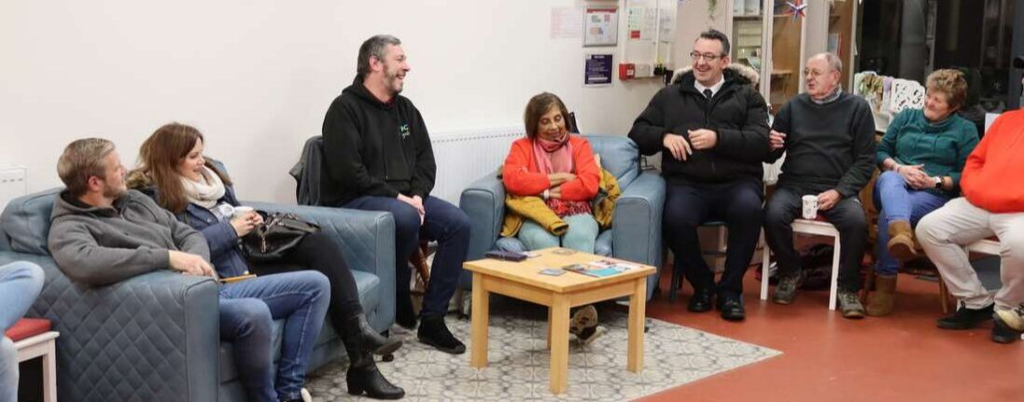
Initial meetings in January 2023 identified ideas such as:
- Chaplaincy support to businesses and people in town centres during the day
- Street Angels twilight to engage with young people
- Safe place drop-in / cafe day and night time
- Street Angels in Colwyn Bay and Rhyl
- Festival Angels around Colwyn Bay park events and maybe Rhyl airshow
- Caravan Park Angels travelling along the many caravan parks across the coast
The next step is to encourage people to sign up as potential volunteers. The aim is to start projects from Easter 2023 onwards.
Paul Blakey MBE, the founder of Street Angels, said, “Street Angels started in 2005 in Halifax as a response to needs and issues on Friday and Saturday nights in the town centre. Within twelve months there was a reduction in violent crime of 42% and Street Angels quickly became a model of best practice that has inspired over one hundred local projects working on the streets, inside pubs and clubs, at music festivals, within communities and through chaplaincy. Street Angels is a response to local issues with the church and community working together to offer a practical front-line response.”
Funding has come from the North Wales Police and Crime Commissioner’s Innovate to Grow initiative. This fund helps support new and innovative ways of solving the problems that can often lead to criminal behaviour in communities.
Chief Inspector Jeff Moses from the Local Policing Senior Management Team commented: “We have been working closely with ROC to help the start-up of this scheme in our area. So far there has been a great response from local people who are keen to support. The Street Angels scheme has clear benefits in keeping our streets safer and also in making people feel safer, which is important. We happen to have one of the lowest crime rates in the UK but every incident of crime or anti-social behaviour on our streets creates victims, and the damaging effects can be significant to those people. The scheme will help us to reduce crime and anti-social behaviour and will reduce the number of offenders coming into the criminal justice system. We are grateful to the Police and Crime Commissioner for allocating grant money to enable the set-up of the scheme.”
More information on Street Angels can be found at streetangels.org.uk
Churches Count on Nature 2023 (3rd – 11th June).
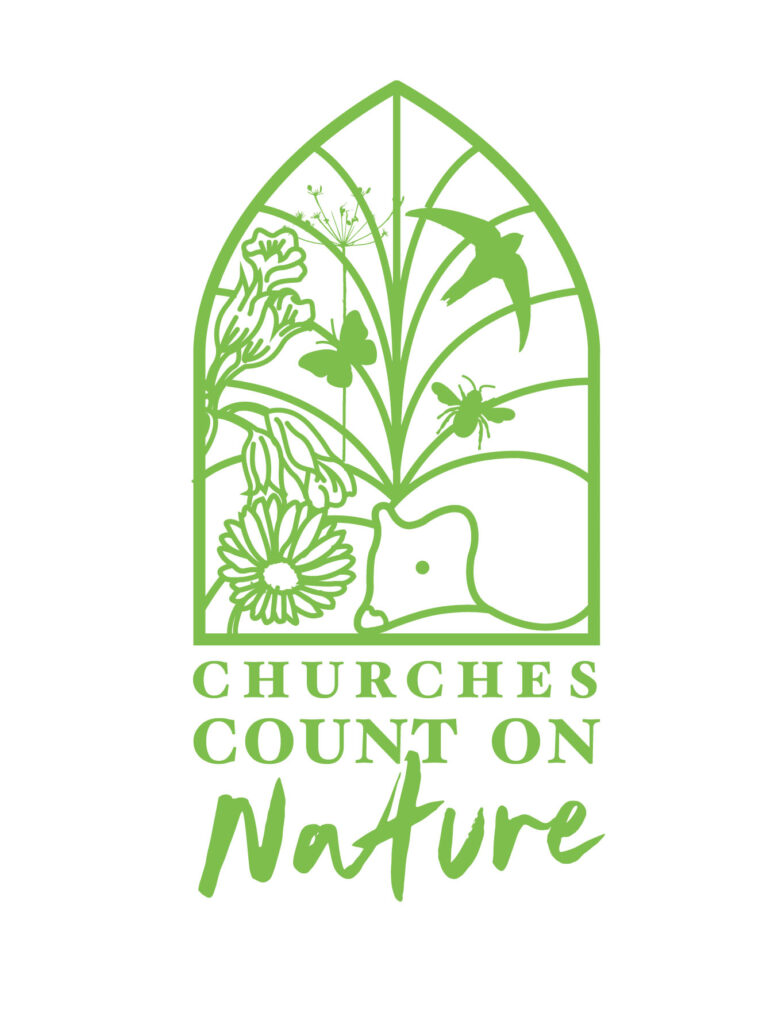
Churches Count on Nature 2023 is a week-long opportunity to focus on the wonderful wildlife to be found in our churchyards, graveyards, and burial grounds (and any other land your chapel or church has!). It is an annual, joint initiative promoted by Caring for God’s Acre, A Rocha UK, the Church in Wales and the Church of England, and encourages people connected with our churches and churchyards to arrange nature-focused activities and events during this week.
It is open to churches of all denominations. Participation offers great opportunities for inviting the wider community onto church land, reaching out and making connections. We are particularly looking for increased participation from chapels and churches in Wales this year.
The wildlife event could be any nature activity in the churchyard – nature walks, trails, tidy-ups, displays or the construction of habits to encourage wildlife, and could either be run or organised exclusively by the church or in partnership with local organisations such as local wildlife trusts.
If the activity involves counting wildlife species, you could take part in a national survey and get your churchyard on the map. Your species data would also be added to the National Biodiversity Network website map!
Registration is free and once registered, you will receive two copies of the Churches Count on Nature Starter Guide and a Guide to Wildlife in Burial Grounds.
THE WORLD CHURCH IN WALES
Wales is privileged to be able to host congregations from many parts of the world church. Mazin Alfaham, Secretary of Cytûn member, the Iraqi Christian Association in Wales, which draws together Iraqi Christians from many Christian traditions, reports on its recent activity:
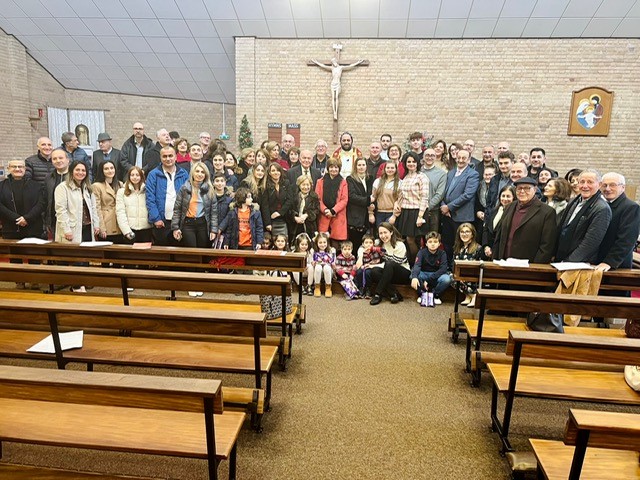
Our group met for our Annual Christmas Mass. These Masses are always conducted in Arabic/Aramaic and also partly in English. It was held at The Holy Family Church in Fairwater and was ministered by Fr Aphram of the Syriac Orthodox Church. Fr Aphram travelled on the day from London for this purpose.
We regularly conduct fundraising activities in aid of our Christian Communities in Iraq, Syria and Jordan. Throughout the year we attend and support our local Welsh churches and strongly promote assimilation with them. We believe strongly in Christian Unity. Those who attended our Christmas Mass were from several denominations, but we prayed together, united under the Banner of our Lord, Jesus Christ.
NEW LAWS FOR WALES
As we go to press, two new laws have passed all their stages in the Senedd and are awaiting Royal Assent. They are:
- The Environmental Protection (Single-use Plastic Products) (Wales) Bill to prohibit the supply of specified single-use plastic products and provide power for Welsh Ministers to add to the list of those prohibited. These will include plastic stirrers, plates and cutlery; balloon sticks; single-use carrier bags; polystyrene cups; and others.
- The Social Partnership and Public Procurement (Wales) Bill which established a tripartite Social Partnership Council of government, employers and trades unions and gives it advisory and consultative functions; requires public bodies who procure goods and services to do so in a socially responsible way, in conformity to the Well-Being of Future Generations Act; and to manage contracts to ensure that socially responsible outcomes are pursued through supply chains.
A number of other new laws are making their way through the Senedd. They include:
- The Health Service Procurement (Wales) Bill which enables Welsh Ministers to create procurement procedures for NHS Wales. Cytun, along with a number of other third sector organisations, has expressed concern that this Bill contains none of the socially responsible objectives of the Social Partnership and Public Procurement (Wales) Bill, and we are seeking a commitment to (for example) purchasing Fair Trade goods and avoiding exploitation of workers and the environment in NHS supply chains.
- The Historic Environment (Wales) Bill, which consolidates existing legislation on the historic environment (such as listed buildings) and makes some tidying-up amendments to it. This includes clarifying some of the law around ‘ecclesiastical exemption’, whereby some Christian denominations carry out their own procedures for listed building consent.
- The Agriculture (Wales) Bill, which will introduce a new system of agricultural support, rewarding conservation of natural resources as well as food production. The bill also introduces a dispute resolution system for tenant farmers; additional forestry powers for Natural Resources Wales; and will prohibit the use of snares and glue traps.
- The Environment (Air Quality and Soundscapes) (Wales) Bill (widely known as ‘the Clean Air Bill’) which aims to reduce air pollution and noise pollution, by providing new powers to Welsh Ministers to create clean air or low emission zones; to prohibit vehicle idling; and to strengthen smoke control and local air quality management.
- The Taxis and Private Hire Vehicles (Wales) Bill is currently in the form of a White Paper, inviting public responses to its proposals to introduce national minimum standards for taxi drivers and vehicles, permit local authorities to enforce regulations on taxis licensed in other authorities; and accelerating the transition to low emission taxi vehicles.
- The Welsh Language Education Bill is also a White Paper, proposing strengthening of local authorities’ duties to promote Welsh medium education and the aim of 1m Welsh speakers.
Each year, one backbench Member of the Senedd can introduce a bill of their own. There are two currently progressing through the Senedd:
- The Food (Wales) Bill, introduced by Peter Fox MS, aimsto set ‘food goals’ for public policy in Wales; to establish a Wales Food Commission and annual Food Strategy for Wales; require local authorities and other public services to develop local food plans; and introduce steps to reduce food waste.
- The Outdoor Education (Wales) Bill, currently being developed by Sam Rowlands MS, would establish a duty on local authorities to ensure that all young people are provided with at least one week’s residential Outdoor Education at some stage during their school years.
Neither of these bills has Welsh Government support, so they will require all-party backbench support to become law.
A new Welsh Government legislative programme will be announced in July. The Laser Group of church and society and public affairs officers of churches and Christian organisations in Wales monitors this legislation in detail at its bimonthly meetings. This is also reported to the UK-wide Radar Group meetings of equivalent officers from all the nations of the UK. Cytûn co-ordinates this work on behalf of the churches, and readers’ comments are welcome via gethin@cytun.cymru
FORTHCOMING EVENTS
After Traidcraft: What’s Next?
Tuesday 2nd May, 7-8pm online.
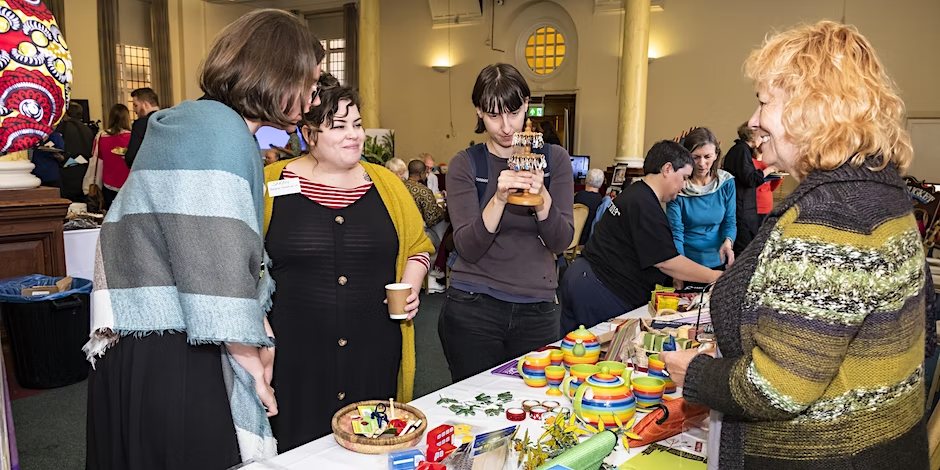
Has your church been affected by Traidcraft’s closure in Wales? Would you still like to support Fair Trade? Come to this webinar to find out what support is available and share the impact this is having in your community.
This event is organised by Cytûn and Fair Trade Wales and it will be bilingual, with translation from Welsh to English.
Book your place today on Eventbrite.
National Parenting Initiative – Visioning Events



The National Parenting Initiative invite you to join them online and be encouraged about ways your church can support and empower families in your community and see them flourish. Featuring Care for the Family, Home for Good and Kitchen Table Project among other fantastic organisations, these events will give an opportunity to ask questions and be inspired.
Register for free through the following links:
South Wales Vision event 3rd May, 12-1
Mid Wales Vision event 7th June, 12-1
North Wales Vision event 5th July, 12-1
If you would like further information please email Kayte Potter: kayte@thenpi.org.uk
CONTACTING CYTÛN’S POLICY OFFICER
Parch./Revd Gethin Rhys – Swyddog Polisi/Policy Officer
Cytûn – Eglwysi ynghyd yng Nghymru/Churches together in Wales
Registered office: Room 3.3, Hastings House, Fitzalan Court, Cardiff CF24 0BL
Mobile: 07889 858062
E-mail: gethin@cytun.cymru www.cytun.co.uk @CytunNew
Hapus i gyfathrebu yn Gymraeg ac yn Saesneg.
Happy to communicate in Welsh and English
Cytûn is a registered company in England and Wales | Number: 05853982 | Registered name: “Cytûn: Eglwysi Ynghyd yng Nghymru/Churches Together in Wales Limited” | Cytûn is a registered charity | Number: 1117071
Publication date: March 29 2023. The next Bulletin will be published on May 25 2023.
